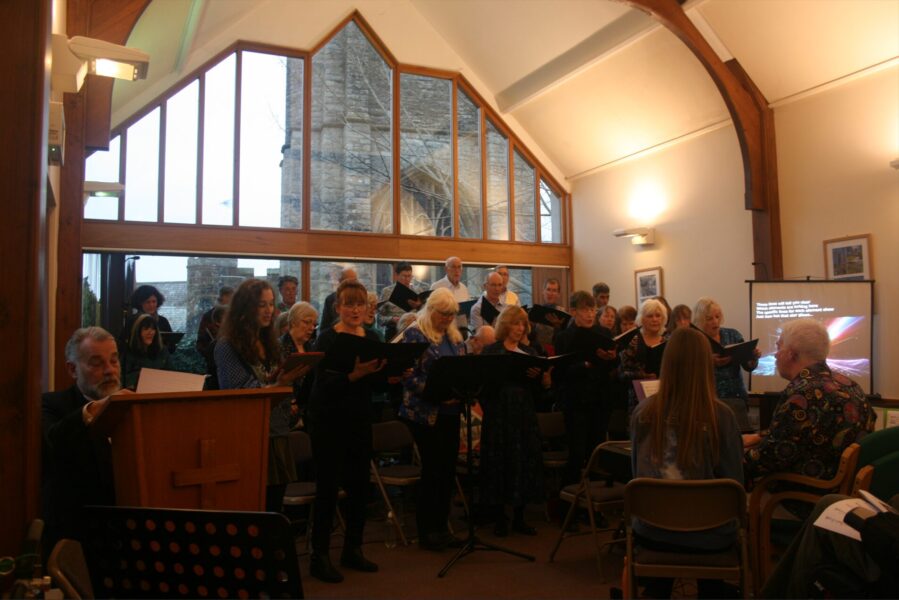
After our deep, charming conversation about his work and upcoming science choir in Exeter, around the middle of December, another message slid into my inbox from composer David Haines. He was offering the chance to cover one of the new choir’s Thursday night rehearsals in Streatham Court C, on Streatham campus.
First of all, for avoidance of doubt, I cannot actually sing. Not even a note.
‘I am not exaggerating when I say that more than half the members of my choir said “I can’t sing”,’ David fired back, comforting me with the fact that genuine tone deafness is extremely rare among humans. He suggested a ten minute one-to-one before the practice to help me find where my vocal range lay, and as things which nervously gnaw on the edge of your mind do, the day of that session soon arrived.
After some time straining my voice box to find if any high notes were secretly living within, I was surprised to discover that singing wasn’t so hard after all. ‘You can hold a note!’ David informed me. A huge relief – if my rasping voice crashed through the rest of the choir during the actual performance, at least it would be in tune.
The choir covered a wide range of science-grounded material as the evening unfolded, impressively threading upbeat lyrics with obscure trivia – I now know that slime moulds (a type of protist) can track down food at the end of labyrinths. The melodies themselves weren’t sterile like petri dish jelly either – the night’s tunes ranged from the jazzy swinging of Intelligent Slime Mould to the upbeat and adventurous Going on a Journey (around the Cosmos).
The choir covered a wide range of science-grounded material as the evening unfolded, impressively threading upbeat lyrics with obscure trivia
The choir-goers – some of whom had science backgrounds of their own – gave incredible assurance all the way through, with plenty of humour to keep us all at ease. Praising David for his ability to hold up a more relaxed atmosphere than other choirs they knew, Anthropology PhD student Mark felt that the choir enabled him to unlock his playful self.
‘I feel like there’s more of me to give the world after, because it’s a mood raiser, and there’s science to back that up,’ he told me, adding that the same refreshed, serotonin-based response was behind a cat’s purr.
Another singer, Emma, was taken in by the emotionality of Haines songs, which she had never expected from science-themed music, ‘I think he’s doing something quite special.’

After the session, David extended an invitation to cover one of his forthcoming performances in Ashburton, a pretty village cradled under Dartmoor. He promised a chance to ‘see what I’m really about’ – the culmination of what the band had been practicing months towards.
The show, a feature of his science-themed musical and magnum opus, Granny Galactica, was a combined event featuring 34 chorists from the science choir and David’s Teignmouth-Ivybridge band, South Devon Singers. As with any good community event, there were ample refreshments – cream tea and coffee – though Devon’s purists will be dismayed to hear that the cream wasn’t underneath…
Among the singers was writer and biologist Dr. Emily Grossman, whose science books for children were on sale during the show. Dipping through a copy of World-Whizzing Facts, I was impressed by a packed coverage of sustainability issues – breaking down concepts from exoplanets to ‘embedded’ emissions (the carbon costs of producing items). Printed in accessible font, the refreshing book ended on a ten-point message of reassurance spurring action from young readers (and adults) who may be overwhelmed by the realities of climate.
It was a theme that, listening Granny Galactica, felt all the more appropriate.
After a well-humoured rehearsal, the crowds finally filled the empty church hall mid-afternoon to hear an opening which paid clear homage to Stanley Kubrick’s 2001; a collection of songs celebrating the diverse beauty of life on Earth kicked off, before the audience was catapulted into space to greet a humanoid satellite – Cynthia – as she twirled elegantly in geostationary orbit.
A chance encounter with robot suitor Franklin set Cynthia and stargazing hero Granny Nettle on a journey through the cosmos to meet Franklin’s makers, the alien Fnirks. Expecting a warm welcome from the creatures, who had observed decades of life on Earth as TV entertainment, the Fnirks are instead revealed to have ignorantly destroyed life on all their previous home planets in the name of sport, leaving Earth as their next target.
As the skies darkened behind the tower of St. Andrew’s church outside, the play posed us with an emotional critique of humanity’s own environmental destruction, highlighting the delicacy and small size of our planet’s ecosystems. But it was a final, potent twist – a call to action – that would be the show’s final message. As the singers tolled jubilantly throughout, Granny Galactica reminds us that we are ‘citizens of the world, citizens of the universe’, with a duty to conserve the natural world we are given before we attempt to flee elsewhere.
What should a good citizen do, you might ask? Well, joining David’s science choir might be a good place to start…


